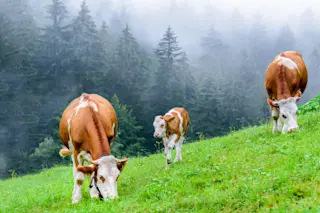Every morning, Breanna Roque goes out to the barn to feed the cows. But this isn’t your typical farm — in fact, it’s a laboratory. The University of California, Davis graduate researcher spends her time among bovines, tweaking their diets so that they burp less. Why? Less burps means less methane. And less methane, on a global scale, could mean slowing down climate change.
Roque is part of a team feeding cows a special diet, one that includes small portions of a sticky, red seaweed called Asparagopsis. It’s not the typical fare for the grass-happy bovines, but the seaweed-infused feed serves a specific purpose — keeping the cows’ prodigious methane production in check.
Yes, cow burps, (not farts, as often believed), release a considerable amount of methane into the atmosphere. The EPA estimates that cows and other ruminating animals, like cows and sheep, produce an estimated one third of U.S. ...














